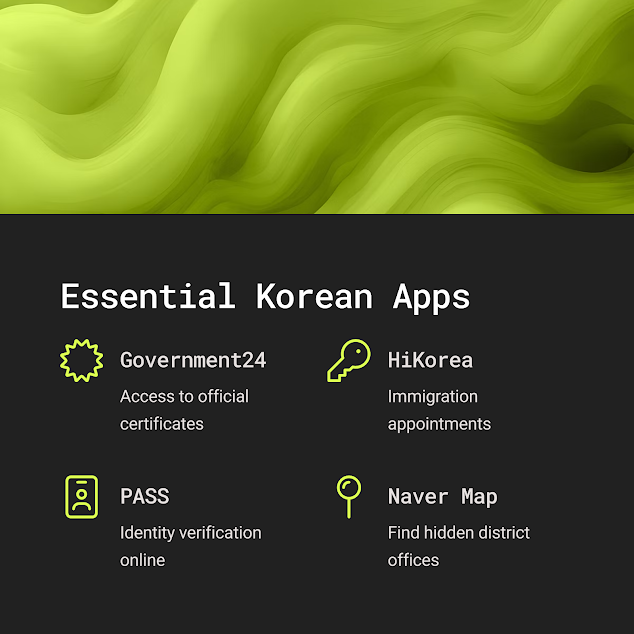Real-world tips from a Korean-American U.S. Army veteran living in Korea
How to Tackle Korean Paperwork, Systems, and Public Offices Without Losing Your Mind
As a Korean-American U.S. Army veteran now living in Korea, I thought my heritage would make settling here smoother. I was wrong. Korean bureaucracy is efficient—but only if you understand how to work with it. This guide breaks down the essential tips I wish I had known earlier, tailored specifically for fellow veterans and expats navigating Korea’s administrative maze.
Prepare for Paperwork—Lots of It
Almost everything in Korea requires documents, stamps, and ID copies
From opening a bank account to getting a phone plan, you’ll need your ARC (Alien Registration Card), a Korean phone number, and sometimes a physical stamp (dojang).
Without these, even basic tasks can become exhausting. Always keep multiple copies of key documents and carry your ARC everywhere.
Learn the Key Terms and Office Types
Korean government offices are specialized and follow strict protocol
Know the names of the main offices you’ll interact with:
| Korean Term | English Name | Purpose |
|---|---|---|
| 구청 (Gu-cheong) | District Office | Residency, utilities, voting |
| 출입국 (Immigration) | Immigration Office | ARC, visa renewals |
| 주민센터 | Community Service Center | Local certificates, welfare |
| 세무서 | Tax Office | Tax ID, business registration |
Pro tip: Bring a Korean speaker with you, especially during your first visits.
Patience and Politeness Go a Long Way
Military directness doesn’t always work in Korean public service culture
While clarity and confidence were essential in the Army, in Korea, soft tone, patience, and respectful gestures often lead to faster results. Bureaucrats follow process—not urgency.
When frustrated, step back. Losing your temper could delay your paperwork or get you blacklisted from assistance.
Be Ready to Visit in Person—Repeatedly
Many services aren’t fully online (yet)
Unlike the U.S. where digital paperwork is the norm, Korean systems still rely heavily on in-person verification and hard-copy submissions. You might need to visit multiple offices just to finish one process.
And yes, lunch breaks mean closed counters. Time your visits accordingly.
Visa and ARC Renewal: Start Early
Do not wait until the last minute for immigration tasks
ARC renewals, visa changes, and re-entry permits often take 2–4 weeks. Missing a deadline can lead to fines or even deportation.
The HiKorea.go.kr site lets you book appointments and check processing times. It’s a must-bookmark for any long-term resident.
Korean Apps That Make Life Easier
Use the right tools to skip unnecessary steps
Here are some useful apps to manage bureaucracy:
| App Name | Function |
|---|---|
| Government24 | Access to official certificates/documents |
| HiKorea | Immigration appointments and notices |
| PASS (by KT/SKT/LGU+) | Identity verification for online access |
| Naver Map | Navigate to hidden district offices |
Many of these apps require phone verification tied to your Korean ID, so set that up early.
Taxes and National Health Insurance
Veterans need to clarify dual-income and residency status early
If you're earning income in Korea or abroad, consult a bilingual tax advisor. Also, once you become a resident, you'll likely be enrolled in Korea’s National Health Insurance—and billed for it.
Don't ignore these bills. They can accumulate quietly and lead to penalties.
Get Support from Veteran and Expat Communities
You’re not alone in this bureaucratic journey
Join online groups, embassy support programs, or veteran meetups. Communities like VFW Korea, Reddit’s r/korea, and Facebook groups for expats can provide real-time advice, translation help, and emotional support.
Key Insight: Bureaucracy doesn’t get easier—it gets more manageable with experience and the right allies.
Final Thoughts: Don’t Let the System Break You
Adjusting to Korean systems takes time—but it’s completely doable
As a veteran, you already have discipline, structure, and endurance—exactly what’s needed to thrive in Korea’s red-tape-heavy environment.
Final tip: Stay organized, stay calm, and never show up to a Korean office empty-handed.











